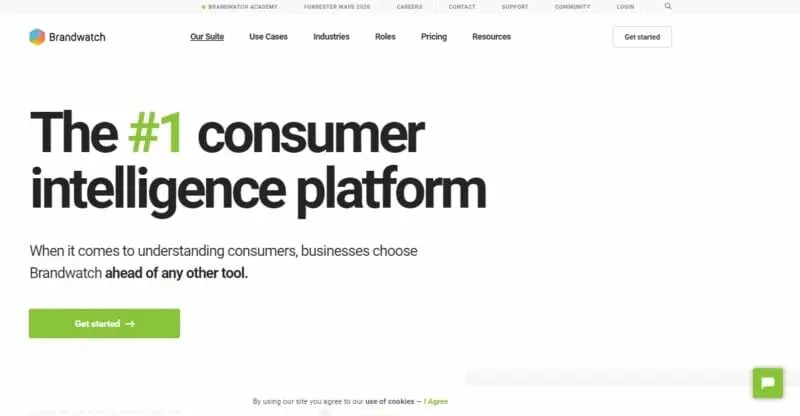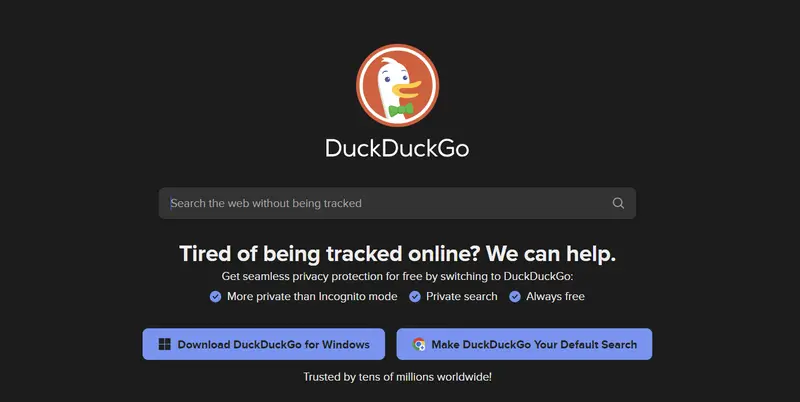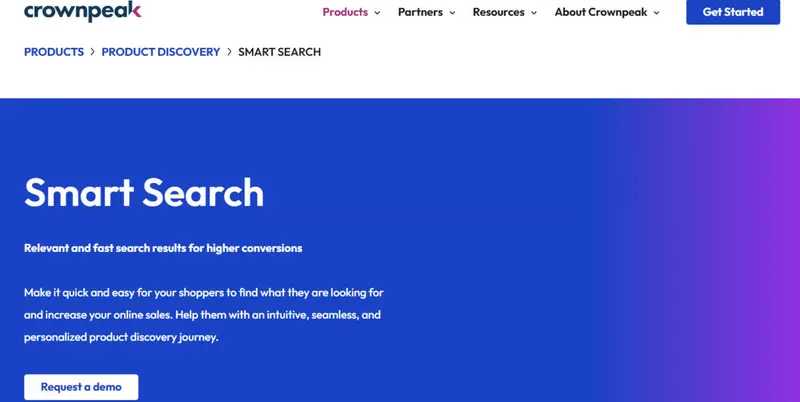In recent years, artificial intelligence (AI) has gained significant traction, driving both curiosity and widespread adoption in various industries. This trend is particularly evident in marketing, where over 61% of professionals have incorporated AI into their strategies, with nearly 44% utilizing it specifically to enhance content production.
Recent advancements in machine learning-based automation, computer vision, and deep learning have paved the way for new applications of AI in marketing and other business operations. For instance, AI-powered search engines are seeking to improve their capabilities by emulating human-like responses.
These search engines scour the vast amounts of information available on the internet, analyze it thoroughly, and then deliver results to users using their own words. This approach provides more accurate answers that are also easier to comprehend.
The influence of AI on search is pervasive, impacting everything from the search results you see to the related topics recommended for further exploration. Modern search engines heavily depend on AI to operate effectively, and comprehending how AI works in the context of search can aid in optimizing your brand's marketing efforts and improving your website's ranking.
Top 7 AI Search Tools to Boost Your Efficiency:
Brandwatch Consumer Intelligence is great for marketers. It helps you gain valuable insights into your target audience through an AI-driven search engine. Brandwatch uses smart AI to collect and analyze massive amounts of data from social media, news, and other online sources to identify trends, sentiment, and other important metrics. This helps you get the inside scoop on what people are saying about your brand. This collection of posts, comments, and conversations relevant to your brand is combined with powerful search capabilities, so you can better understand consumer behavior, preferences, and sentiment in real-time. Additional AI features include Iris, an AI analyst that automatically surfaces insights, performs image analysis, and auto-segmentation to fit your specific needs. Product Hunt is a free global community of millions of tech fans, founders, investors, and journalists who use the platform to find new products and evaluate competitors. To enhance the user experience, Product Hunt uses AI in several ways. For example, their recommendation engine leverages machine learning algorithms to suggest relevant products based on your browsing history and other behavioral data. This helps you discover new and interesting products that align with your interests. Additionally, Product Hunt uses natural language processing (NLP) to analyze and categorize product descriptions, making it easier for you to search for products using natural language queries. And to ensure a high-quality experience, Product Hunt leverages AI to monitor user activity and filter out spam and low-quality content. DuckDuckGo, a privacy-focused search engine, has launched a new AI-powered feature called DuckAssist. The feature uses natural language technology from OpenAI and Anthropic, along with DuckDuckGo’s active indexing of Wikipedia and other reference sites, to provide natural language summarization capabilities. At launch, DuckAssist is only available on the DDG app and browser extensions, but the company plans to make it available to all search users soon. The company is also experimenting with adapting sourcing to the context of the query. While DuckDuckGo’s search engine already has an Instant Answers feature that displays answers directly above the usual list of links for specific queries, generative AI summarization has made it possible to answer more queries directly. DuckDuckGo calls this a fully integrated Instant Answer since it allows users to directly answer more search queries without having to visit a website. For online retailers looking to improve their eCommerce metrics, Crownpeak’s suite of AI-driven visual merchandising and eCommerce personalization solutions can help. Crownpeak works with global brands in various sectors, including fashion, beauty, and home goods, to optimize their product offerings and deliver personalized shopping experiences to their customers. One of Crownpeak’s key solutions is smart search. This solution uses machine learning algorithms to provide highly relevant and fast search results, making it easy for your shoppers to find what they’re looking for and increasing your online sales. With the use of filters, navigation, and merchandising rules, Crownpeak’s smart search delivers a seamless and personalized product discovery journey that inspires your shoppers while meeting your business needs. With features like NLP, autosuggest, dynamic filters and facets, and search relevance algorithms, Crownpeak’s smart search delivers highly relevant search experiences across any channel and enhances your product findability. By combining real-time shopper behavior with advanced search algorithms and synonyms, Crownpeak’s smart search can help your shoppers find the right product fast. The search engine You.com, launched in 2017 to provide more personalized results, has introduced a chatbot on its website inspired by ChatGPT. Since its launch in December 2022, YouChat has been updated to version 2.0. YouChat’s advantages include its current training and language model, C-A-L, which stands for conversations, apps, and links. The ability to integrate You.com apps for sites like Reddit and YouTube within the chatbot’s functionality is likewise a significant development. The chatbot’s user interface also features AI art creation capabilities and context from Wikipedia and other apps. Microsoft has announced an AI-powered Bing search engine and Edge browser to offer a better search experience with complete answers, a new chat feature, and the ability to generate content. These tools function as AI copilots for the web. The new Bing experience is made possible by four technical breakthroughs: the next-generation OpenAI model, the Microsoft Prometheus model, the AI core search algorithm, and a new user interface. The improved Bing search experience provides more relevant results for simple things like sports scores, stock prices, and weather, along with comprehensive answers that summarize results from across the web. Bing’s AI-powered search engine provides comprehensive answers by summarizing information from various sources on the web. For instance, if you’re looking for instructions on fixing broken plumbing, Bing will give you detailed instructions without requiring you to sift through multiple results. Moreover, Bing’s new chat experience uses AI to assist you with complex searches, such as planning a travel itinerary. With interactive chat, you can refine your search by asking for more details, clarity, and ideas until you get the complete answer you need. Links to relevant web content are also available so you can act on your decisions immediately. Phind (formerly Hello Cognition) is a search engine designed for developers that provides immediate answers to technical questions. It extracts information and code examples from technical sources and ranks raw site data from Bing. Phind uses large language models to extract understanding and BERT-based models to extract and rank code snippets. It simplifies all this input into a final explanation using seq-to-seq transformer models. Phind’s user interface is clutter-free and intuitive, and it offers customized search using filters, allowing you to change how results are ranked by adding domain names and keywords.1. Brandwatch Consumer Intelligence
Pros:
Cons:
2. Product Hunt
Pros:
Cons:
3. DuckAssist by DuckDuckGo
Pros:
Cons:
4. Crownpeak
Pros:
Cons:
5. YouChat by You.com
Pros:
Cons:
6. Bing AI
Pros:
Cons:
7. Phind
Pros:
Cons:
What is AI Search?
Search is a critical aspect of the online shopping experience, as it helps customers discover and purchase products they are interested in smoothly. However, search engines have traditionally struggled with presenting relevant results that match the shopper's search queries accurately. For instance, searching for "bag" might not yield results for "clutch.” This poses a problem, as simply stuffing more keywords into product pages to compensate for these discrepancies can negatively impact the user experience. As a result, shoppers may receive irrelevant or inaccurate results.
Artificial intelligence provides a solution to these search-related issues while also optimizing your platform for better conversion rates. With AI, you can quickly and accurately deliver highly relevant search results from the first query. Since search bars often facilitate complex and unstructured conversations with potential customers, AI plays a vital role in interpreting these search queries and presenting a curated marketing experience that aligns with their intent and showcases your best products.
AI systems can operate autonomously and improve over time by learning from their results, as they excel at identifying patterns in data and using them to create predictions. These predictions can include everything from predicting the next product someone may buy to determining what type of content someone may want to consume next. As AI systems make these predictions, they learn from them and become more astute over time.
Search has become too complex for humans or traditional machines to handle, with Google alone processing an estimated 99,000 searches search queries every second, or about two trillion searches each year. Without AI, it is impossible to deliver reliable search results in real-time at this scale. Because of this, AI is now used in almost every part of a search engine, including indexing and understanding the information on all online pages, interpreting search queries, and matching them to the most accurate and high-quality results. In essence, every search result you see is a direct product of AI calculations.
How Are AI-Powered Search Engines Changing the Enterprise Landscape?
As machine learning is incorporated into every aspect of search engine services, AI has a crucial role in helping consumers find what they're looking for quickly. The relevance of content will determine search rankings, which is great news for marketers. As search engines get more advanced, it will still be crticial to use the right keywords and follow standard SEO practices. The relevance and the quality of the content will become even more significant as well.
AI-powered search is the driving force behind popular websites like Pinterest, which leverages deep learning to understand users' intents and deliver personalized search results. With over 450 million active users and billions of "pins," Pinterest has vast data to draw from. For instance, a search for “easy dinner recipe” may yield results ranging from “dump and go crockpot recipes” to “family favorite 30-minute meals,” based on the user's search intent.
As people click on more pins, the deep learning model gets better at figuring out what they want and giving them more relevant search results. As such, this AI-driven platform bridges the disparity between users' search experiences and their high demand for immediate and personalized content.
AI-powered search engines can improve at giving relevant results in real time by collecting more data. This includes browsing history, intents related to those searches and content from previous comparable searches. This can lead to better customer experiences, conversions, and revenue for your business.
Is AI Search Superior to Google?
The rapid evolution of AI-powered search engines has sparked an ongoing debate: Can these emerging tools surpass Google, the longstanding leader in the search engine market? While Google has consistently integrated AI into its platform with innovations like the Search Generative Experience (SGE), AI-specific search engines are gaining attention for their unique advantages, challenging Google’s dominance.
AI search engines, such as Crownpeak and You.com, harness advanced natural language processing (NLP) and machine learning to provide more contextual and personalized search results. These platforms excel at interpreting nuanced queries, delivering responses that are tailored to the user's intent, often in a conversational format. Additionally, AI search engines are increasingly capable of integrating with various data sources and tools, enabling dynamic and interactive search experiences that extend beyond traditional keyword-based methods.
One notable case is Brandwatch Consumer Intelligence, an AI-driven search tool designed specifically for marketers. Brandwatch uses sophisticated AI to collect and analyze vast amounts of data from social media, news, and other online sources.

Brandwatch consumer intelligence
This tool doesn’t just track mentions of your brand but also offers deep insights into consumer behavior, preferences, and sentiment in real-time. By leveraging AI, Brandwatch can identify trends and deliver actionable insights that help marketers understand their audience better than ever before. The platform’s ability to perform complex tasks like image analysis and auto-segmentation demonstrates the powerful capabilities of AI in specialized search contexts, offering a level of detail and accuracy that challenges even Google’s comprehensive database.
Another example is YouChat by You.com, which has introduced AI-powered features that go beyond traditional search. YouChat uses a conversational AI model, which allows users to engage in more interactive and context-aware searches.

YouChat AI assistant
Unlike Google’s standard search results, YouChat integrates responses from various apps, including Reddit and YouTube, directly into the chat interface. This functionality offers users a more tailored and relevant search experience, particularly for those seeking answers across multiple platforms or specific types of content. By offering these capabilities, You.com positions itself as a serious contender in the AI search space, providing a more personalized and integrated search experience.

YouChat AI search engine
However, despite these advancements, Google remains a formidable competitor. Its vast index, robust algorithms, and unparalleled data ecosystem continue to provide a breadth of information that is difficult for any single AI search engine to match. The question of whether AI search engines are superior ultimately depends on the specific needs and preferences of the user. For those looking for more personalized, context-aware searches or specialized insights, AI search engines like Brandwatch and You.com may indeed offer a superior experience. Yet, for broader searches and access to an extensive database, Google’s dominance remains unmatched.
Final Thoughts
The popularity of ChatGPT has led the tech industry to fixate on AI chatbots and search engines and their potential impact on us. These AI machines aim to save you time. However, when you search for something on Google now, you are presented with an endless list of articles and must manually sort through them to find the answer, which is inefficient.
In the real world, you want a brief, tailored answer based on experience that is easy to understand. AI-powered search engines aim to replicate this. They strive to provide quick, relevant, and accurate answers without you having to search for them. Nevertheless, there are still issues with AI search, such as inaccuracy, bias, and redundancy. Providing feedback to the algorithm can help improve its ability to identify the intent and context of your search queries.
In the meantime, the AI-driven search tools noted above can be used to enhance your marketing efforts.
Frequently Asked Questions
What are AI search tools, and how do they benefit businesses?
AI search tools are advanced search engines powered by artificial intelligence technologies such as machine learning and natural language processing. These tools enhance the accuracy, relevance, and speed of search results by understanding context and user intent. For businesses, AI search tools streamline data retrieval, improve decision-making, and provide personalized experiences, ultimately boosting productivity and efficiency.
Which AI search engine is best for enterprise use in 2025?
In 2025, Google SGE (Search Generative Experience) stands out as the best AI search engine for enterprises. It offers robust integration with Google's ecosystem, contextual understanding, and advanced multi-modal search capabilities. This makes it ideal for large organizations needing a reliable and comprehensive search solution that can scale with their needs.
How does Perplexity AI differ from traditional search engines?
Perplexity AI differs from traditional search engines by generating real-time, contextually aware responses instead of simply listing relevant links. It leverages AI to understand complex queries and provide direct, nuanced answers, making it particularly useful for research and content creation tasks where depth and accuracy are critical.
What are the key factors to consider when choosing an AI search tool?
When choosing an AI search tool, consider factors such as scalability, integration capabilities, customization options, data privacy features, and cost. It's crucial to align the tool's features with your business needs, ensuring it can handle your data volume and integrate seamlessly with existing systems while providing robust security measures.
What industries benefit most from AI search tools?
Industries that handle large volumes of data or require precise information retrieval—such as legal, healthcare, e-commerce, and research-driven sectors—benefit the most from AI search tools. These tools help streamline workflows, enhance data accessibility, and improve decision-making, making them essential for staying competitive in data-intensive fields.











